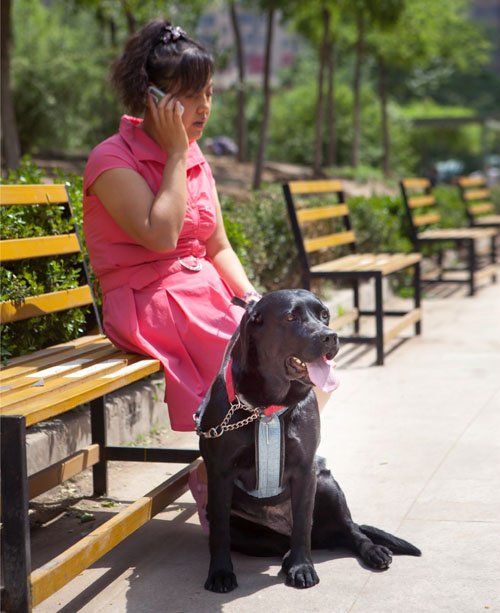
Chen Yan and her guide dog Jenny.
(Ecns.cn)--Chen Yan, who was born with congenital cataracts, thought a guide dog would make her life easier. But because she lives in Beijing, she has found the opposite to be true.
That's because Jenny is forbidden from navigating many public spaces here, including subway stations, supermarkets and shopping malls.
Chen has tried to ride the metro nearly a dozen times with her canine friend, all unsuccessfully. Even after showing subway security that Jenny is a certified guide dog, access is always still denied. She says she has encountered similar problems in restaurants, taxis and airports.
Chen says, "I am trying to be a normal person, but it's too hard."
She says she often pays twice as much for cab rides because only illegal taxis will pick her and Jenny up. Regular cab drivers often tell her that "dogs are not allowed in the car."
The dog has also been kept out of many restaurants and supermarkets, because "they are concerned that Jenny will pollute the food or even steal something to eat," says Chen.
"The thought is ridiculous. Working dogs are not like normal dogs," she explains.
According to China Daily, ignorance, not animosity, is at the root of the problem.
In regard to access for blind people and their guide dogs, a railway station director in Beijing told the newspaper: "We know it is not forbidden, but we don't know how to deal with it and what rules we should abide by."
China has been slow to pass regulations guaranteeing the right of blind people to use guide dogs in public areas, says Beijing Today.
The only law that comes close is Article 58 of the Law on Protection of Disabled Persons, which states that blind people must observe the relevant provisions of the country when entering a public space.
However, "it does not elaborate on what these provisions are and how they are to be followed. In practice, blind people who depend on guide dogs always end up asking for permission to use their dogs wherever they go," You Fangqiu, press officer at the Dalian Guide Dog Training Center, told Beijing Today.
The situation improved a little during the Paralympic Games in 2008, when a temporary regulation required that all public spaces – especially Olympic gymnasiums and stadiums – be open to the visually impaired and guide dogs.
But the rule was lifted on September 20 the same year. "With my guide dog, I can go nowhere," said Ping Yali, a gold medalist at the Paralympics.
Regulation of normal pets also complicates guide dog use in the capital.
Currently, Beijing residents living within the Fifth Ring Road are not allowed to own large dogs at all, even though guide dogs tend to be larger breeds like Golden and Labrador retrievers. The ban also prohibits owners from walking dogs during daytime.
The regulations may do little to impede people from owning large breeds (or taking dogs out during the day) but greatly hinder the blind, who must apply for guide dogs through complicated procedures. The rules work against them on two fronts.
Qi Jinyou, a blind Beijinger and director of Xicheng District's Association for the Blind, has appealed to the government on multiple occasions to pass laws that protect guide-dog users.
Hangzhou, the capital of Zhejiang Province, will reportedly break the ice this October by allowing the blind to take subways with their dogs.
"At present, without a guide dog we have no freedom. But even with a guide dog, we still have no freedom. It's a waste of resources," said Qi.
Moreover, training a guide dog is not only complicated, it's also expensive. According to You Fangqiu, it costs his center 120,000 yuan to train one guide dog, and many of them will fail to graduate.
Obesity is also becoming a problem for underused guide dogs. Without much exercise, Chen Yan said Jenny has gained 5 kilograms. She has already spent 1,200 yuan to help the dog lose weight.
Guide dogs remain a relatively new concept in China, so regulations are only the first step in guaranteeing the rights of the blind. Public education is even more important, You Fangqiu added.
"Guide dogs allow blind people more freedom and boost their confidence. It helps them to feel they are not a burden on society," You explained. "When they run up against barriers to dog use in public spaces, it can deal a crushing blow to their confidence. It can be hard to recover from that."

Copyright ©1999-2011 Chinanews.com. All rights reserved.
Reproduction in whole or in part without permission is prohibited.